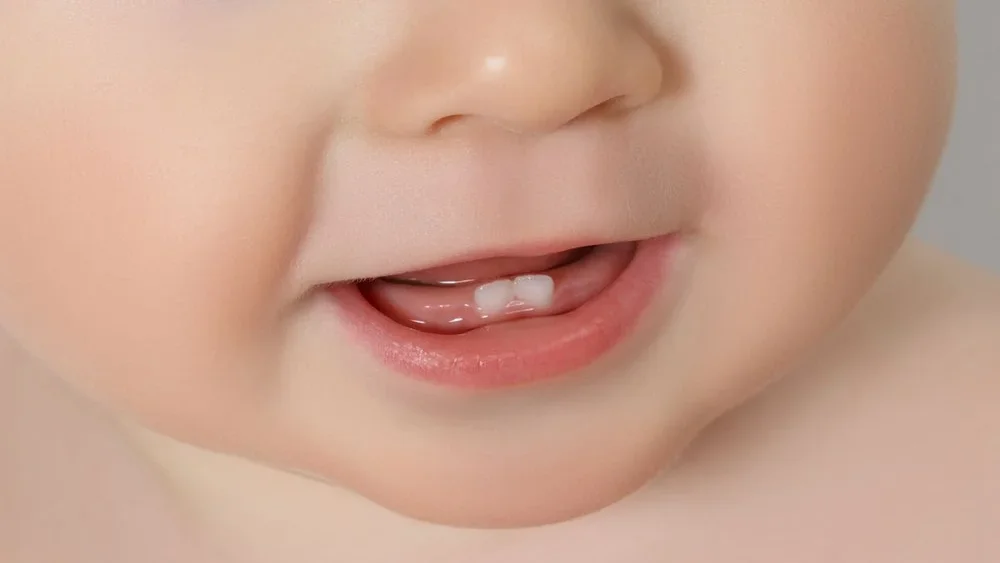What signs indicate the baby teething and at what age does it typically occur?
Baby teeth, referred to as deciduous or primary teeth, start forming even before birth. Many parents are unaware that newborns already have a full set of 20 baby teeth, although they are hidden beneath the gums.
At what age can a baby teething start?
Typically, infants begin the process of tooth eruption between 6 to 10 months after birth. However, in some instances, the initial signs of teeth may appear as early as 3 months, while others may experience this developmental stage around their 12th month. Nonetheless, the precise timing of tooth eruption varies from one child to another. Teething unfolds as a gradual process during which a baby’s teeth start emerging through the gums. The sequence and timing of tooth eruption may also differ, but most children typically have a complete set of primary (baby) teeth by the age of 3.
- The initial teeth that commonly appear are the two central incisors located at the bottom front.
- Subsequently, the four upper front teeth (central and lateral incisors) typically emerge 4 to 8 weeks later.
- Approximately a month later, you can anticipate the emergence of the lower lateral incisors, which are the two teeth situated on either side of the bottom front teeth.
Which baby teeth typically cause the most discomfort?
The teething process for babies can be uncomfortable, but it’s a natural aspect of their development.
- First Molars: First molars can occasionally cause discomfort as they are larger and flatter than other teeth, making them more susceptible to inflammation and pain.
- Canine: Canine teeth, which usually emerge between the ages of 16 and 20 months, can also cause some discomfort. These teeth have a pointed shape, and the sensation of them pushing through the gums can be uncomfortable for some children.
- Incisors: Incisors including the central and lateral ones, are typically among the first baby teeth to appear, usually around 6 months of age. While they may cause some mild discomfort, they are generally less painful than molars or canines due to their smaller size.
Common signs and symptoms of teething in babies include:
Excessive Saliva and Rash: Due to increased saliva production, babies may develop a rash around their mouth, chin, or neck. To address this, provide a teething toy, such as a rubber teething ring, to satisfy their urge to bite or chew.
Baby Teething Temperature: While teething itself typically doesn’t cause a high fever, a slight elevation in temperature is a common teething symptom, though it shouldn’t be very high.
Loss of Appetite: Teething can impact a baby’s appetite, leading them to be less interested in eating and potentially refusing breast or bottle feeding temporarily.
Ear Pulling: Some babies may tug or pull at their ears while teething, which may indicate referred pain as the nerves in the gums and ears are interconnected.
Cheek Rubbing: Babies may rub their cheeks against their shoulders or crib while teething, possibly as a way to alleviate discomfort.
Importance of Minerals and Vitamins: Minerals and vitamins play a crucial role in the development and overall health of infants, including during the teething process.
Calcium: Essential for the development and maintenance of healthy teeth and bones, calcium is particularly crucial during teething as the baby’s body requires extra calcium to support the growth of new teeth. Inadequate calcium intake can lead to dental problems and delayed tooth development.
Phosphorus: Vital for strong teeth and bones, phosphorus works in tandem with calcium to form the hard structure of teeth, making it an important nutrient during teething.
Iron: Critical for overall growth and development, including the development of oral structures like the jaw and teeth, iron deficiency can result in delayed tooth eruptions and oral health issues.
Why choose baby teething gel?
Parents should prioritize safety precautions and consider Warsan homoeopathic pharmaceutical product, Vita-C Teething Drops, for safe and gentle teething relief. These baby teething tablets offer significant relief and aid in the efficient and rapid eruption of baby teeth by providing essential minerals. Additionally, they promote an increase in the child’s appetite and enhance digestion, all while alleviating discomfort.
Take care of baby teething:
- When all your baby’s teeth have grown: This is the time for parents to start taking care of their baby’s oral health, typically around the age of 2 or 3 years old.
- Brush them at least twice a day: Help your child brush their teeth twice daily, ideally in the morning and before bedtime.
- Especially: It’s important to wait at least 30 minutes after meals before brushing to allow saliva to naturally neutralize acids and protect tooth enamel. If your child eats, it’s a good idea to brush their teeth afterward to remove food particles and maintain cleanliness.
- Introduce flossing early: Flossing involves using a small string to clean between teeth. Start teaching your child how to floss when their teeth start touching each other. This usually occurs as they grow older and more teeth come in.
- A suitable time to begin flossing is when two teeth start touching each other: Once your child’s baby teeth are close enough together to touch, that’s the ideal time to start teaching them how to floss. This typically occurs as they grow older and more teeth come in.
Choosing Premium Supplements from Warsan Homeopathic
At Warsan Homeopathic, we’re committed to providing men with premium-quality best vitamin supplements for men that address their unique health needs. Our extensive range of vitamin and herbal formulations undergoes strict quality control measures to ensure purity, potency, and safety. Whether you’re looking to support muscle health, boost cardiovascular function, enhance cognitive performance, or improve sexual vitality, we have a solution for you. With Warsan Homeopathic, you can trust that you’re investing in your health and well-being.


